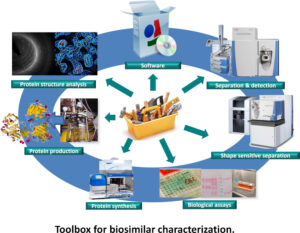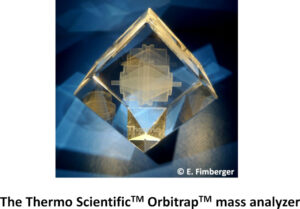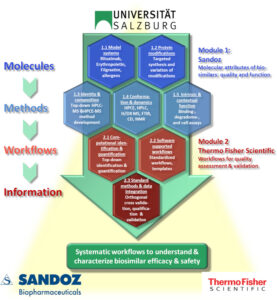The Christian Doppler Laboratory for innovative tools for the characterization of biosimilars has been operating from 01.10.2013 – 30.9.2021.
For summary of research results and scientific output please see under the corresponding menu items.
Watch our corporate video!
About
The Christian Doppler Laboratory for Innovative Tools for Biosimilar Characterization is a research collaboration between the University of Salzburg, Novartis (Kundl, Austria), and Thermo Fisher Scientific (Waltham, MA, USA). It is primarily funded by the Austrian Federal Ministry of Economy, Family and Health through the Christian Doppler Society. The primary goal of the research project is to discover and develop innovative tools to characterize biotechnologically produced proteins that can be used as medicines by joining academic expertise in physical, biological, and functional protein characterization with industrial know-how in protein production, protein characterization, safety regulations, and pharmaceutical development. Novartis, a world leader in the development, production, and marketing of therapeutic proteins, as well as Thermo Fisher Scientific, one of the most renowned suppliers of scientific instrumentation and software for analytical characterization, are setting the collaboration on a profound industrial and application-oriented background.
Mission and Goals
Upon joining expertise at the University of Salzburg in protein production and characterization, bioanalytical chemistry, synthetic chemistry, and structural biology, this research project aims at developing innovative characterization tools for biosimilarity, using and combining highly informative technologies and methods such as high-performance liquid chromatography (HPLC), high-performance capillary electrophoresis (HPCE), mass spectrometry (MS), multistage mass spectrometry (MS/MS), crystallography, chemical synthesis, and biological assays. Novartis, the largest pharmaceutical company in Austria, has established renowned competence centers in Austria, making Novartis a worldwide leader and the preferred collaboration partner in the production and marketing of biosimilars. Thermo Fisher Scientific, one of the global leaders for providing most of the technologies that will be utilized by the team in protein characterization, is also joining the research project, which sets to project on a solid instrumental, methodological, and (bio-)informatic basis.
More specifically, researchers will begin developing biosimilar characterization methods using well-defined pairs of biosimilar and originator proteins to derive quantifiable parameters for biosimilarity. The proteins Rituximab, Erythropoietin, and Pegfilgrastim were selected as representatives for various kinds of biopharmaceutical drugs. Chemical synthesis will be employed to obtain protein molecules with well-defined modifications such as glycosylation, amino acid transformations, oxidation, or acetylation. HPLC and HPCE hyphenated to high-resolution MS/MS will be implemented for providing highly informative data for identification, sequence confirmation, and detection of co- and post-translational modifications. Conformational variability will be studied with conformation-sensitive methods such as HPCE, size-exclusion HPLC, or light scattering methods. Three-dimensional structures of the biosimilars, also interacting with target molecules/receptors, will be characterized by crystallography, which will facilitate to better understand the biological function of the biosimilars.
Drug-target interactions will be studied by binding assays, affinity HPCE, affinity HPLC, and crystallography. Modes of action as well as toxic effects of the drugs will be investigated by using model cell cultures treated with the active compounds and measuring the effect on the transcriptome, proteome, and metabolome. The in-vitro testing with cells will be supplemented with a degradome assay, which has been shown to provide information about the potential of selected proteins to elicit an immune reaction.
Innovation and basic aspects of research elaborated in this project mainly encompass the systematic implementation of powerful characterization methods such as HPLC-MS, HPCE-MS, crystallography, and biological in vitro assays to the derivation of structure-activity relationships using well-defined, well characterized, and designed protein molecules, which will finally lead to a better understanding of relevant parameters for describing the safety and efficacy of biosimilars. The results of this research will help both Novartis and Thermo Fisher Scientific better understand and support the future development of biopharmaceutical drugs and analytical technologies for proteins, respectively.
Organization of Modules and Workpackages
The research program is organized into two modules, each supported by one of the two industrial partners Novartis and Thermo Fisher Scientific, respectively. Tasks and deliverables will be subdivided into work packages that reflect the different goals followed in the research program as well as the methodology employed. Module 1 focuses on the preparation and characterization of the molecules of interest and the methods employed for that purpose, while Module 2 concentrates on the composition of workflows that will allow the generation of the data in a systematic and automated fashion. The following graphic gives an overview about the different modules and work packages implemented in the modules:







